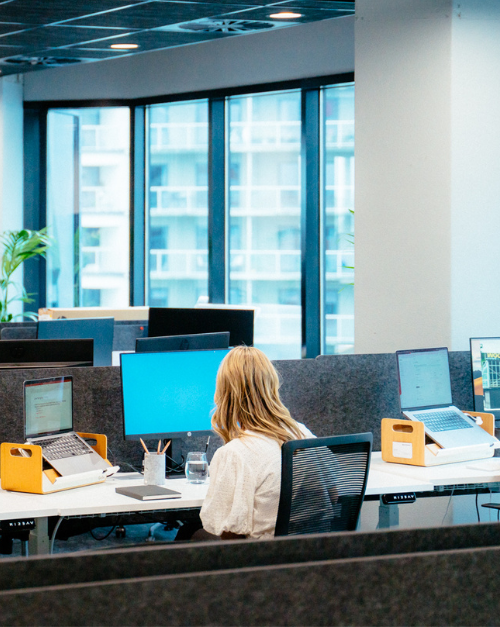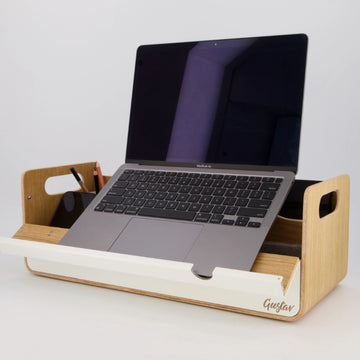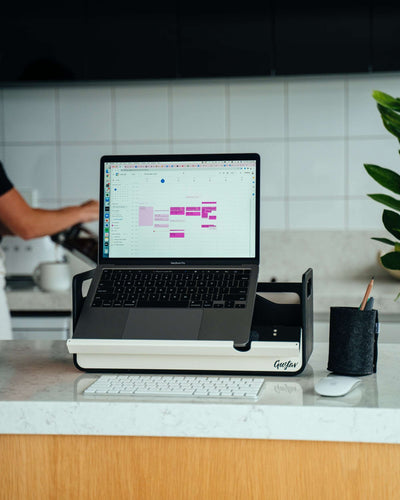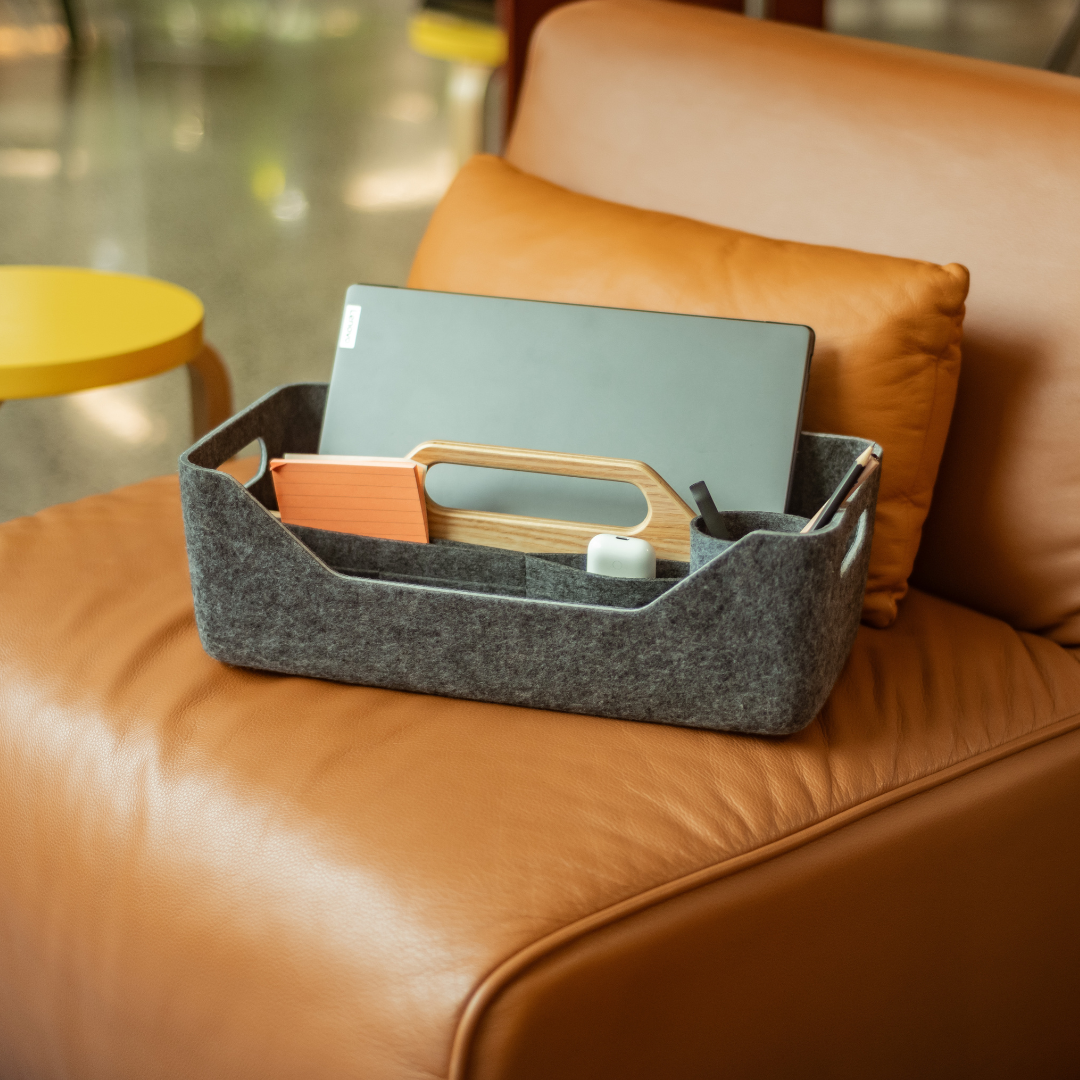Why Desk Sharing?

Key Facts and Figures for Businesses
Is your business ready to embrace the future of work? Let's explore how desk sharing can revolutionize your workspace!
Before we dive into the growing popularity and use of a desk sharing approach in companies worldwide, it's essential to define what hot desking actually means. At its core, hot desking or desk sharing means that people don’t have assigned desks in the office. Instead, there's an inventory of desks open to, and bookable by, everyone. This system is particularly relevant in today’s hybrid work environment.
Consider this: on a typical Tuesday, perhaps only 30% of your employees come into the office, and maybe only 25% on a Friday. In such a scenario, what’s the point of maintaining a pre-pandemic system of designated desks? Most of these desks end up unused, leading to a significant waste of office space and financial resources. If, for instance, 40-60% of your 100 pre-assigned, fixed desks are going unused during the week, that’s a clear indicator of inefficiency and unnecessary expense.
Desk Sharing and Hot desking, therefore, makes eminent sense in this context. It's not just a space-saving tactic; it's a strategic move towards a more dynamic, cost-effective, and employee-friendly workplace. The right implementation of desk sharing can transform the way businesses operate, leading to significant gains in efficiency, innovation, and employee well-being.
Now, let’s delve deeper into the multiple benefits this approach offers, from cost savings and increased flexibility to boosting productivity and employee satisfaction.

Cost Efficiency
-
Reduction in Space Needs: Imagine cutting down your office size by up to 30%. This is not just about shrinking space; it's about optimizing it. By adopting desk sharing, companies can maintain a vibrant, fully-functional office with less physical space, potentially transforming unused areas into creative or recreational zones that further enhance the work environment.
-
Real Estate Savings: Studies have found that about 40% of office space remains vacant at any one time.Hot-desking can reduce the costs of running an office by as much as 30%. Reducing real estate costs is a strategic financial maneuver. This saving can be redirected to other critical areas like technology upgrades, employee training, or even towards increasing salaries, thereby indirectly contributing to greater employee satisfaction and retention.
Increased Flexibility
-
Adapts to Workforce Fluctuations: Desk sharing isn't just about where you sit; it's about aligning your physical workspace with the dynamic nature of today's work. It seamlessly accommodates varying schedules of part-time, remote, and flex-time employees, ensuring that every square foot of your office is utilized efficiently.
-
Responsive to Change: In an era where business agility is key, a workspace that can quickly adapt to organizational shifts and market changes is invaluable. Desk sharing offers this agility, enabling companies to be more responsive and resilient in the face of change.
Boost in Productivity
-
Enhanced Collaboration: Many desk sharing 25% increase in employee collaboration and communication means breaking down silos and fostering a culture where ideas and information flow freely. Shared spaces encourage spontaneous interactions and discussions, leading to richer collaboration and a more cohesive team dynamic.
-
Innovation Uplift: With a 15% rise in creative interactions, shared spaces become hotbeds of innovation. Employees from different departments or specialties mingling in the same space can lead to unexpected brainstorming sessions and cross-pollination of ideas, driving innovation.

Employee Satisfaction
-
Work-Life Balance: Hybrid work offers a better work-life balance for employees and flexible workspaces as part of the concept are a testament to evolving nature of work. Flexible workspaces provide employees with the autonomy to choose how, when, and where they work, contributing significantly to their overall well-being and job satisfaction.
-
Choice and Control: Many employees feel more in control of their environment. This control over their work environment can lead to a more engaged and motivated workforce.
Environmental Impact
-
Reduced Carbon Footprint: A reduced office space leads to a significant decrease in carbon emissions - which is not only good for the planet but also enhances the company's profile as a responsible and sustainable business. Fewer resources needed for space means a smaller ecological footprint, aligning with global sustainability goals.
-
Sustainable Practices: Desk sharing promotes a culture where sustainability is ingrained in everyday practices, encouraging responsible resource use and fostering a sense of communal responsibility among employees.
Tech Integration
-
Enhanced IT Utilization: More efficient use of technology resources is crucial in a digital era. Desk sharing can lead to smarter IT investments and usage, ensuring that technological resources are maximized and not wasted.
-
Support for Digital Transformation: Aligning with the digital-first approach of modern businesses, desk sharing is a step towards a more integrated, technology-driven work environment. It supports the seamless integration of digital tools and platforms into daily work processes.
Challenges and Solutions
-
Privacy Concerns: Addressed innovatively with sound-proof areas and private zones, ensuring that while collaboration is encouraged, the need for privacy and focused work is not neglected.
-
Hygiene and Safety: Maintained through rigorous cleaning protocols and personal hygiene stations, ensuring a safe and healthy environment for all employees, which is especially crucial in the post-pandemic world.
In essence, desk sharing is not merely about saving space; it's a strategic, multifaceted approach to evolving workplace demands. It’s about creating a workspace that is dynamic, cost-effective, and fosters a sense of community and collaboration while ensuring employee well-being and environmental responsibility.
Case Study: Drei/Hutchison in Vienna, Austria To see these principles in action, let’s consider Drei/Hutchison in Vienna. This case study illustrates how reducing from 1500 to 900 desks not only maintained but actually enhanced employee satisfaction. It’s a real-world example of the transformative power of desk sharing when implemented thoughtfully and strategically.
Desk sharing is not just a space-saving tactic; it's a strategic move towards a more dynamic, cost-effective, and employee-friendly workplace. The right implementation can transform the way businesses operate, leading to significant gains in efficiency, innovation, and employee well-being.
Is your business ready to embrace the future of work? Let's explore how desk sharing can revolutionize your workspace! 🌟
Read more about the best Tools for Desk Sharing or further Desk Sharing Success Stories.









